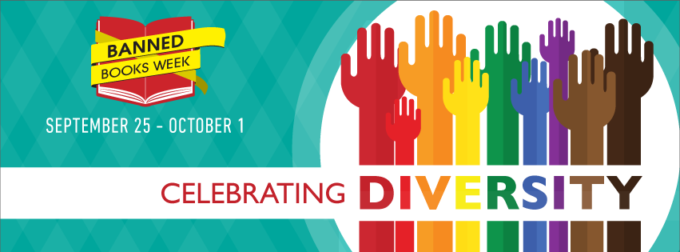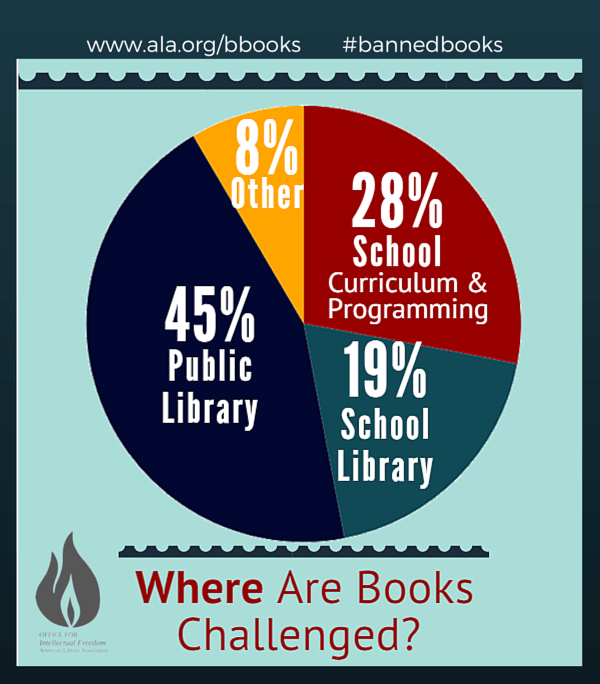Today marks the start of one of the most important weeks of the year: Banned Books Week. Why is it so important? Simple: it’s all about protecting your right to read, and your right to decide what your kids read. It’s about telling the world that you won’t let anyone rob you of your right to explore the world through the words of another, be it fiction or non-fiction. It’s about standing up and saying “I am capable of making my own decisions regarding the material that I read and that I allow my children to read. I do not need you to make this decision for me.”
Celebrate Diversity During Banned Books Week
This year, Banned Books Week has a very special theme: Celebrating Diversity. If you read my post about how we need more diverse books, you’ll know why this matters so much. Children and teens are more likely to read a story that features a main character that they can relate to. It’s just common sense. We all sort of put ourselves into the shoes of the lead role, and that’s easier when we see something of ourselves in that character. We want to see someone like us triumph over the antagonist because it gives us hope that we can do the same against the antagonists in our own lives.
It is so important that all children have this chance, to see themselves in a story’s character, to see someone exactly like them triumphing over adversity. Yet every day, diverse books are being challenged or banned across the nation. Look at these statistics from the Banned Books Week website:
The University of Wisconsin’s Cooperative Children’s Book Center (CCBC) and publisher Lee & Low have provided statistics from 1994 to 2012 that illustrate that while 37% of the U.S. population are people of color, only 10% of books published focus on multicultural content. In addition, ALA’s Office for Intellectual Freedom, has determined that 52% of the books challenged, or banned, over the past decade are from titles that are considered diverse content.
The reasons behind the bannings and challengings do not matter, but the article cites “outcry of parents” as the primary reason. One segment of parents who decide what all other children should or shouldn’t read. One segment who is so terrified of diversity, of people who are different from them in some ways, that they have to rip that diversity from the hands of all children.
It’s not just the children portrayed in the diverse books that lose out when these stories are ripped from the shelves. Other children- and adults- lose the opportunity to see the world outside their own door, their own race, gender (or gender identification), religious and philosophical beliefs. When we start taking that away, start limiting children to a specific pre-approved story, we’re removing their chance to grow, learn, explore, accept & respect others. We’re making the world a very narrow-minded, bleak place.
Diverse books matter, for all these reasons and more.
Top 20 Frequently Challenged and Banned Diverse Books
For the full list of 58 books, please visit the Banned Books Week Frequently Challenged Books with Diverse Content article.
- A Gathering of Old Men by Ernest J. Gaines
- A Hero Ain’t Nothin But a Sandwich by Alice Childress
- A Lesson Before Dying by Ernest J. Gaines
- Absolutely True Diary of a Part-Time Indian by Sherman Alexie
- All American Boys by Jason Reynolds
- Always Running by Luis J Rodriguez
- Am I Blue?: Coming Out from the Silence by Marion Dane Baue
- And Tango Makes Three by Justin Richardson and Peter Parnell
- Anne Frank: The Diary of a Girl
- Annie on My Mind by Nancy Garden
- Autobiography of Malcolm X by Malcolm X; Alex Haley
- Baby Be-Bop by Francesca Lia Block
- Beloved by Toni Morrison
- Beyond Magenta: Transgender Teens Speak Out by Susan Kuklin
- Black Boy by Richard Wright
- Bless Me, Ultima by Rudolfo A Anaya
- Color of Earth by Kim Dong Hwa
- Daddy’s Roommate by Michael Willhoite
- Drama by Raina Telgemeier
- Fallen Angels by Walter Dean Myers
I am shocked to see such important historical stories like The Diary of Anne Frank and the Malcolm X biography on the list.
Support diverse books during Banned Books Week by checking out the ways you can get involved. These range from simply changing your Facebook and Twitter profile pic to hosting your own banned books readathon.





I do think it’s important for kids to read books from different cultures and perspectives. Diverse books definitely matter!
Diversity in literature, especially children’s lit is so important. I know there are many authors out there publishing more books on diverse topics, which is great. Kids need to see themselves in books, while also learning about others.
Good to know that there’s a week like this to help broaden a child’s knowledge on books and reading. I can’t believe that there are books on the list that will really help educate a child about our history. That’s alarming.
Oh, this is a nice share. I haven’t heard of this celebration, I will tell my daughter about this.
I am not familiar with diverse books but sounds like the children don’t need much of them. There are many great cultures but the children should be knowledgeable with his first.
Wow, I did it know Anne Frank was on it. That is an important piece of history that we must not forget.
this is very interesting i would love to visit those books and see them. sure they are interesting and would love to know each of the books
Diversity is so important in reading. I don’t censor any of my son’s reading. I don’t believe in banning books.